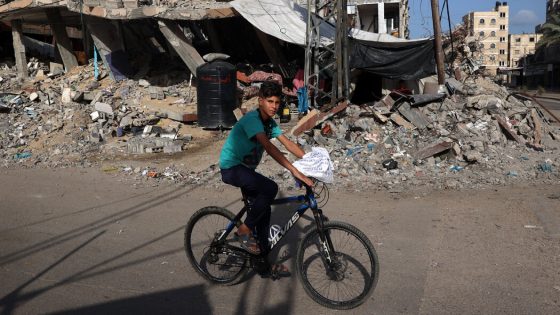A half-dozen masked assailants ransacked the headquarters of Venezuelan opposition leader Maria Corina Machado on Friday in the latest escalation of violence against opponents of Nicolás Maduro following the country’s disputed presidential election.
The raid occurred at about 3 a.m., Machado’s party said, adding that the assailants broke down doors and hauled away valuable documents and equipment. Images published by Machado’s party on social media show several walls covered in black spray paint.
The assault comes as top officials, including Maduro himself, have threatened to arrest the opposition leader, who has gone into hiding as she seeks to rally Venezuelans and the international community to challenge last Sunday’s election results.
The United States has thrown its support firmly behind the opposition, recognizing last-minute candidate Edmundo González as the victor and discrediting the official results of the vote proclaiming Maduro the winner. Argentina did so on Friday.
Machado — who was barred from running for president — and González addressed a huge rally of their supporters in the capital, Caracas, on Tuesday, but they have not been seen in public since.
In an op-ed published on Thursday in the Wall Street Journal, Machado said she is “hiding, fearing for my life, my freedom, and that of my fellow countrymen.”
The re-election of Venezuelan President Nicolás Maduro has sparked violent protests across the country as the opposition — and much of the world — questions the legitimacy of the outcome. Andrew Chang explains why the result is in dispute, and what it could mean for a country in a years-long crisis.
Calls for an impartial audit of results
The U.S. announcement late Thursday followed calls from multiple governments, including close allies of Maduro, for Venezuela’s electoral authorities to release precinct-level vote counts, as it has done during previous elections.
The electoral body declared Maduro the winner on Monday, but the main opposition coalition revealed hours later that it had collected copies of 80 per cent of the country’s 30,000 voting tallies and that they show González prevailed by a more than 2-to-1 margin.
“Given the overwhelming evidence, it is clear to the United States and, most importantly, to the Venezuelan people that Edmundo González Urrutia won the most votes in Venezuela’s July 28 presidential election,” U.S. Secretary of State Antony Blinken said in a statement.

Maduro responded with a quick admonishment: “The United States needs to keep its nose out of Venezuela!”
González, whose location is also unknown, posted a message on X, formerly Twitter, on Friday thanking the U.S. “for recognizing the will of the Venezuelan people reflected in our electoral victory and for supporting the process of restoring democratic norms in Venezuela.”
The U.S. government announcement came amid a flurry of diplomatic efforts by Brazil, Colombia and Mexico to convince their fellow leftist to allow an impartial audit of the vote. On Thursday, the governments of the three countries issued a joint statement calling on Venezuela’s electoral authorities “to move forward expeditiously and publicly release” detailed voting data.
But it’s unclear what leverage the countries have over Maduro, who has shown little inkling to rethink his entrenched position. A previous effort to marshal international support over opposition figure Juan Guaido in 2019 — who was recognized by the Trump administration as the interim president though he held no levers of power — did not change political or social conditions on the ground.
The Current19:06Protests erupt in Venezuela over election results
Protests have erupted across Venezuela over the results of the country’s recent presidential election. The country’s electoral authority declared President Nicolás Maduro won Sunday’s election, but the opposition says its candidate had more than twice as many votes as Maduro.
Massive loss of citizens
While no ally or anyone in the armed forces has yet to break with Maduro over the contested elections, he faces huge obstacles righting Venezuela’s economy without the legitimacy that can only come from a credible election result.
Venezuela sits atop the world’s largest proven crude reserves and once boasted Latin America’s most advanced economy, but it entered into freefall marked by 130,000 per cent hyperinflation and widespread shortages after Maduro took the helm in 2013 from socialist predecessor and mentor Hugo Chávez.

More than 7.7 million Venezuelans have left the country since 2014, the largest exodus in Latin America’s recent history.
U.S. oil sanctions have only deepened the misery, and the Biden administration — which had been easing those restrictions — may ramp them up again unless Maduro backs down and agrees to some sort of transition.
“He’s counting on being able to wait this out and people will get tired of demonstrating,” said Cynthia Arnson, a distinguished fellow at the Wilson Center, a think-tank in Washington, D.C. “The problem is the country is in a death spiral, and there’s no chance the economy will be able to recover without the legitimacy that comes from a fair election.”
On Monday, after the National Electoral Council declared Maduro the winner of the election, thousands of opposition supporters took to the streets. The government said it arrested hundreds of protesters, and Venezuela-based human rights organization Foro Penal said 11 people were killed. Dozens more were arrested the following day, including a former opposition candidate, Freddy Superlano.
Maduro asked Venezuela’s highest court this week to conduct an audit of the election, but that request drew almost immediate criticism from foreign observers, who said the court — which, like most institutions in the country, is controlled by the government — lacks the independence to perform a credible review. Asked why electoral authorities have not released detailed vote counts, Maduro said the National Electoral Council has come under attack, including cyberattacks, without elaborating.
Venezuela’s Supreme Tribunal of Justice agreed to conduct the audit and ordered Maduro, González and the eight other candidates who participated in the presidential election to appear before the justices on Friday. A spokesperson for González said he did not know if the candidate planned to attend.
Source Agencies



